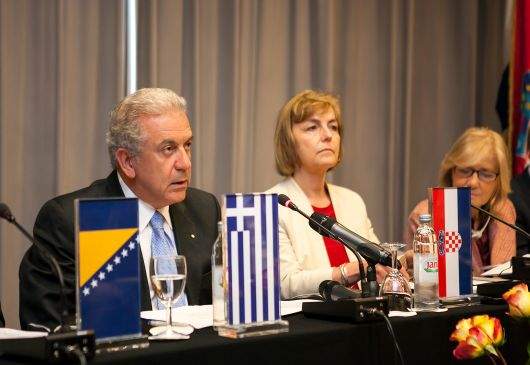 D. AVRAMOPOULOS: I’m very happy to be here in the beautiful city of Dubrovnik, invited by my very good friend and colleague Vesna Pusic, who took the initiative to invite us here, along with my good colleagues from neighboring countries.
D. AVRAMOPOULOS: I’m very happy to be here in the beautiful city of Dubrovnik, invited by my very good friend and colleague Vesna Pusic, who took the initiative to invite us here, along with my good colleagues from neighboring countries.
We met here today as neighbours with a common vision for our energy future and as partners in our full support for the TAP and IAP pipelines.
We reaffirmed our strong shared political will to back these two major energy projects that will play, in the future, a crucial role in the energy security of Southeastern Europe – and not only.
Energy issues impact our countries and societies on every level.
They are central to our economies.
They are central to prospects for development.
And for the next 100 years, energy will determine the nature and pace of global economic growth.
A secure energy supply makes our economies more stable, independent and more competitive.
So these two pipelines – the TAP and the IAP – can benefit our region in myriad ways.
Most importantly, they can be seen as a regional cooperation platform.
They will create common interests.
They will meet regional needs.
They will bring mutual benefits.
This is why Greece has so actively supported the TAP project. In the last two months alone, I have been to Baku twice – the second time accompanying Greek Prime Minister Antonis Samaras. And we had excellent talks with the leadership of this great country.
This past February, in Athens, we signed, with our Albanian and Italian partners, a trilateral agreement that has already been ratified by our Parliaments.
And two months later, in Rome, we set up a trilateral Cooperation Committee whose task is to coordinate efforts to promote the TAP project.
So together, as energy partners, we are working to bolster our individual and regional geopolitical position and standing.
Because all the TAP-IAP partners will become an integral part of the southern energy corridor that will be carrying Azerbaijan’s natural gas to European markets.
And this means we, as energy partners, will have a role in helping the EU implement its diversification strategy, thus bringing our region even closer to Europe.
At the same time, these two pipeline projects will combine to bolster energy diversification in our own neighborhood.
Areas previously dependent on other energy sources will have access to a secure supply of clean, affordable energy.
And our regional cooperation will be strengthened as our economies become more and more interconnected.
And the creation and development of local gas networks and markets will also generate growth.
In Greece alone, the TAP project means 2,000 new jobs directly related to the pipeline.
It will also generate some 10,000 new jobs peripherally, in local markets.
It means massive and much-needed foreign investment.
And all of the partners in these projects can look forward to similar benefits.
I would like once again to express my thanks to our Croatian friends and, very soon, European partners – we shall be here to share with you the great moment of your accession to the EU – for this very constructive regional initiative.
I also want to express my thanks to my colleagues around this table, who share with us not only our common determination to support the move ahead for this project, but also for something more – a new idea of future political cooperation that will bring our countries much closer to each other.
A visionary initiative that gives new impetus to energy cooperation in Southeastern Europe and puts our region on the global energy map.
Thank you very much.
June 13, 2013


